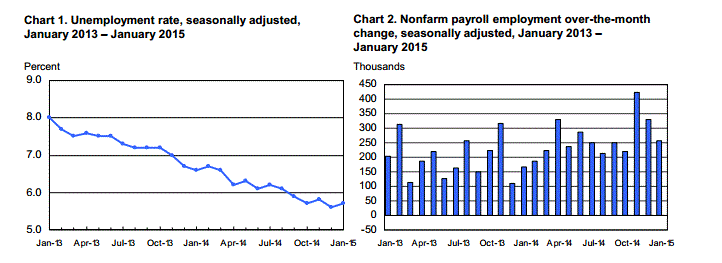Financial news today, Feb. 6, 2015: January's job report showed more jobs were added last month - but the reason isn't healthy...
The U.S. Labor Department reported Friday that 257,000 jobs were added last month. January's report capped the biggest three months of job gains in 17 years.
But turns out workers are taking on more gigs.
"A good fraction of the reported January job gains came from people working multiple jobs," Steven Pressman, professor of economics and finance at Monmouth University in West Long Branch, N.J., told Money Morning. "This increased from 4.9% of employment in December to 5.1% in January."
 That means those people working several jobs were counted more than once, thus artificially inflating the job gains numbers.
That means those people working several jobs were counted more than once, thus artificially inflating the job gains numbers.
The unemployment rate, however, rose to 5.7%. That was up from 5.6% in December. Forecasts had the rate holding steady.
"One reason for the drop in the U.S. unemployment rate over the past few years is that many people gave up looking for work because they felt that there was no chance they would be able to get a job," said Pressman. "This is typical during any recession. When the labor market and the economy improve, and when people think they have a good chance of getting a job, they re-enter the labor market."
During the early 2000s, the labor force participant rate averaged 66%. Over the last five to six years, it fell to under 63%.
"In December 2014, it hit a recent low of 62.7%," Pressman said. "In January, the rate eked up to 62.9%. This is primarily what pushed up the January unemployment rate. While one month of data is not enough to draw any conclusion, we may be at the beginning of a process where people who have given up looking for jobs are indeed beginning to look for work again."
Pressman also noted that the widely applauded 257,000 jobs added last month is just merely close to the job growth needed to meet demand from a rising population, and to deal with those re-entering the labor force.
Jobs gains aside, the most notable number in the January report was the uptick in wages. Average hourly wages rose $0.12 to $24.75 last month. That followed a surprising $0.05 decline in December.
Will Wage Gains Continue?
While jobs gains were widely touted in 2014, wage growth was notably absent.
Year over year (YOY), average hourly earnings rose a meager 1.7% last year. That was below the paltry 2% pace that prevailed throughout the overall job market recovery. It was also well below the 3% rate economists say is healthy.
January's wage increase took the YOY average hourly earnings increase to 2.2%.
January's wage growth, however, could be the result of a one-time event. "Many states increased their minimum wage in January," Pressman noted.
Nonetheless, January's 0.5% increase in wage growth, along with 11 straight months of payroll gains above 200,000, could influence the U.S. Federal Reserve to start lifting interest rates mid-year. The Fed has kept interest rates at historic lows of 0% to 0.25% since the 2008 Great Recession.
Financial News Today Factors on Fed
While the Fed remains on course to raise interest rates this year, no one knows the timing. The Fed wants to see brisk job gains and consistent wage growth of at least 2% before it starts hiking its key interest rate.
Sustained job growth, coupled with rising wages, will help assure policy makers that the economic recovery can handle higher rates.
Most experts had pegged June as the earliest possible date for a hike. But December's surprising wage drop shifted expectations to September.
Today's numbers, however, put a June move back on the table.
"In the face of the headline good news, pressure will be on the Fed to raise interest rates sooner rather than later," Pressman said.
"Still, in light of the rising labor force participation, and wage growth that's barley keeping up with inflation, the Fed would be better advised to keep its powder dry," Pressman continued. "The good news is that we'll get more data on jobs and wages before the Fed needs to make that decision."
When your portfolio has a solid foundation, you don't have to worry that breaking financial news could derail its success... That's why we put together four steps investors can start today to increase gains and limit losses. We also give five of the best stocks for 2015. You can get this free money-making guide here...
Related Articles:
- Bloomberg: Jobs Report Crushes Expectations
- Bureau of Labor Statistics: January Employment Situation
- CNN Money: Hiring still going strong; 257,000 jobs added in January


